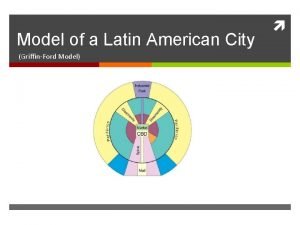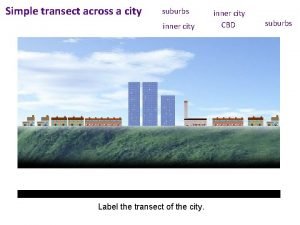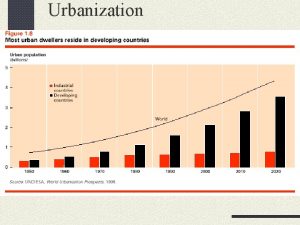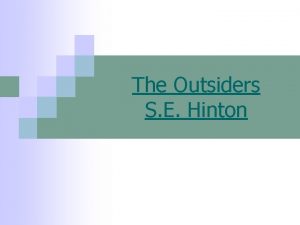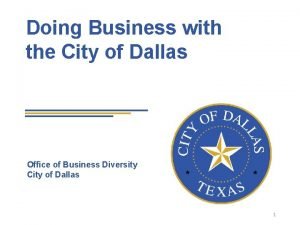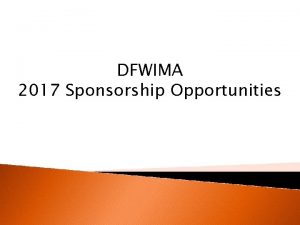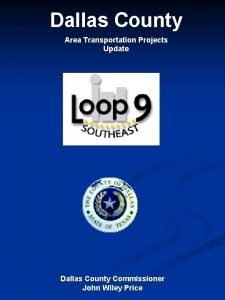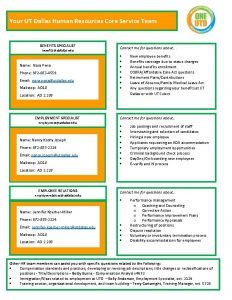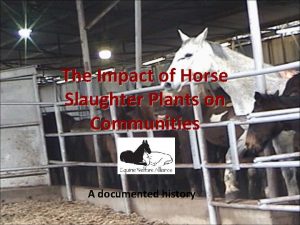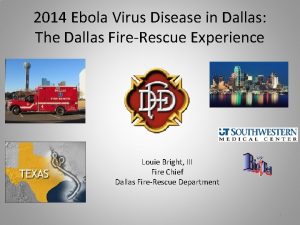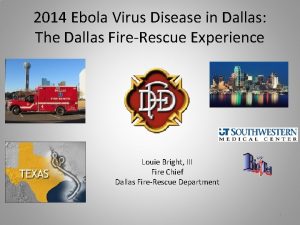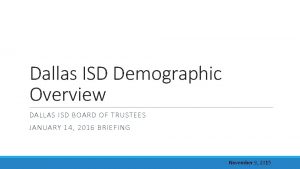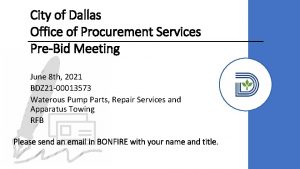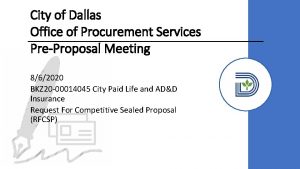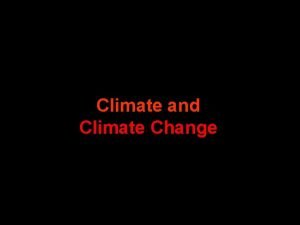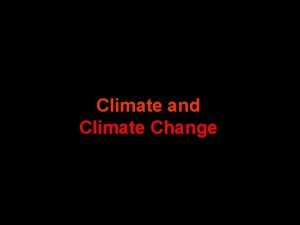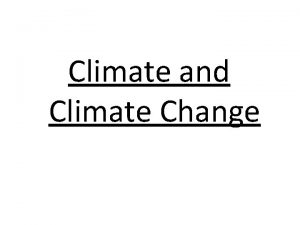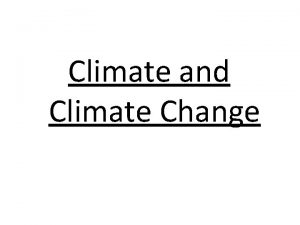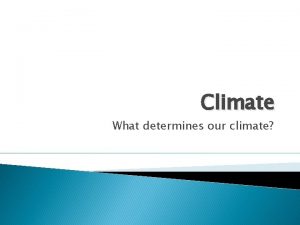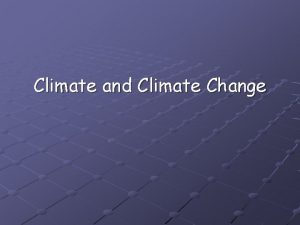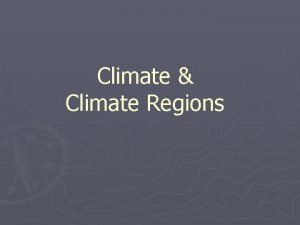City of Dallas Climate Program Status Summary Office


















- Slides: 18

City of Dallas Climate Program Status Summary Office of Environmental Quality Kevin Overton March, 2018

Impacts From the Fourth National Climate Assessment 1. Rising temperatures are leading to increasing demands for water and energy. 2. Changes to crop growth due to warming and changes in rainfall patterns will require changes in agriculture and livestock management 3. Landscape fragmentation is increasing and will hinder the adaption of some species to changes 4. Communities that are currently vulnerable will have additional pressure 5. The magnitude of change will increase at a rate faster than observed over the last century

Impacts on Cities • Heat Waves • Expect 20 more 100 degree days • Heat waves will be more frequent, hotter, and longer • Drought • Models predict a decrease in percipitation • Droughts will increase the risk of wildfires • Floods • Swings in weather will be extreme and more flooding will be likely • Health Risks • Longer growing seasons result in more asthma and allergy problems • Longer breeding seasons for insects will result in more vector borne diseases like Zika or West Nile

Cities Are Vulnerable to Climate Change • 70% of cities world wide are already experiencing effects of climate change • 90% of all cities are in coastal areas that can be impacted by rising sea levels • Cities must absorb the unexpected costs of storms, flooding, drought, and other impacts of climate change

Cities Are Leading the Way • Many mayors pledged to meet the measures of the Paris agreements • Dallas Mayor Michael Rawlings signed the pledge in June 2017 • Mayors of six Texas cities also made this pledge • Those cities have a combined population of about 5. 8 million or about 21% of the total Texas population

Opportunities For Cities to Lead the Way • Cities consume 2/3 of the energy world wide • Cities generate 70% of the world CO 2 emissions • Urban population is nine times larger today than 100 years ago and increasing • Actions taken at the city level can have a major impact • City leaders are more directly accountable to the public than state or federal officials.

Lack of National and State Leadership • The current Administration has announced its intent to favor coal and other fossil fuels over renewable energy • The EPA announced plans to scrap the Clean Power Plan • The State of Texas has no official policy on Climate Change

Where To Start: The GHG Emission Inventory • Developing a Greenhouse Gas (GHG) emission inventory is the first step to taking action to reduce the emissions of GHG • The GHG inventory can be used to identify emission reductions and for planning. Benefits include: • • The identification of emission sources Determining the significance of each source A historical record of emissions for future use Establishment of a solid foundation for decisions and a framework to set goals and targets

A Protocol Is Required For Consistent Results • The International Council for Local Environmental Initiatives (ICLEI) is one commonly accepted protocol • ICLEI offers the “Clear Path” online tool to assist with the inventory • Any city that uses the ICLEI protocol can compare GHG emissions directly to other cities

Emission Inventory Lessons Learned • • Document all assumptions Document all emission factors and calculations Use an accepted protocol and document its use Make results available to the public in a format that people can understand

City Actions to Reduce GHG Emissions The City of Dallas and OEQ work for reductions in GHG to benefit all Dallas residents. City r programs include: • Alternative commute programs • Alternate fueled vehicles • Green Building Program/Energy Efficiency Retrofit Program • Renewable Energy Purchasing Program • Other City activities also mitigate air quality issues

Alternative Commute Program • Encourage City employees to use alternatives to one person/one car commute to reduce air pollution • Alternative commute options: public transportation, car-pooling, bicycling, electric vehicles/hybrid vehicles, and flex days/work from home • Employees track their commutes through Try Parking It website and OEQ • In addition to reducing GHG, this program helps reduce ozone and other pollutants that impact health.

Alternative Fueled Vehicles (AFVs) • Includes vehicles that pollute less, or in some cases do not pollute • AFVs help reduce mobile source emissions of GHG and meet emission reduction targets which helps reduce ozone that contributes to asthma and other respiratory illnesses

City Green Building Program & Energy Efficiency Retrofit Program • Since 2003, the City has built 32 LEED Silver standard or better buildings • Each LEED building uses significantly less energy than a standard building resulting in less GHG pollution from power plants • The City is also retrofitting older buildings with energy efficient lighting/HVAC

Renewable Energy Purchasing • On October 26, 2015, City achieved 100% renewable energy consumption • The City purchases about 720 million kilowatts of energy per year, equivalent to: • 2, 695 railcars of coal; or • the carbon sequestered by 478, 981 acres of forest.

Clean Air Action Day (CAAD) • OEQ annually sponsors CAAD to highlight air quality issues (including climate change) • In 2016 & 2017, OEQ was recognized by NCTCOG for CAAD campaign

Other City activities Many other City activities have the potential to improve regional air quality. Examples include: • Maintenance and improvement of green space • Promotion of residential growth in CBD • An update to the City’s Greenhouse Gas Emission Inventory that can be used to plan for changes to climate that may impact Dallas • Development of low cost air monitors that can be used to monitor pollution levels in neighborhoods

Questions and Comments Office of Environmental Quality Brittany Hailey Environmental Coordinator (214) 671 -8312 brittany. hailey@dallascityhall. com Kevin Overton Senior Environmental Coordinator (214) 670 -3887 kevin. overton@dallascityhall. com
 Climate change 2014 mitigation of climate change
Climate change 2014 mitigation of climate change Weatherbonk
Weatherbonk The latin american city model
The latin american city model Cbd inner city outer city
Cbd inner city outer city Is mexico city a primate city
Is mexico city a primate city What is tams
What is tams Progressive era
Progressive era Randy's girlfriend outsiders
Randy's girlfriend outsiders Iec dallas continuing education
Iec dallas continuing education President of dallas theological seminary
President of dallas theological seminary Doing business in dallas
Doing business in dallas Dfwima
Dfwima Venacure dallas
Venacure dallas Loop 9 dallas
Loop 9 dallas Veterinary radiology dallas county
Veterinary radiology dallas county Ut dallas human resources
Ut dallas human resources Dallas crown horse slaughter plant
Dallas crown horse slaughter plant Carla morrow midwife
Carla morrow midwife Johnny cade physical description
Johnny cade physical description


